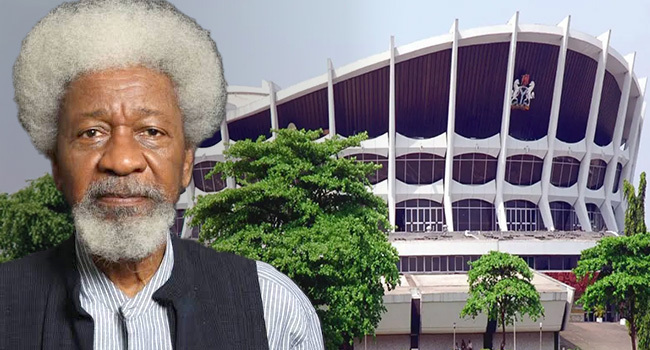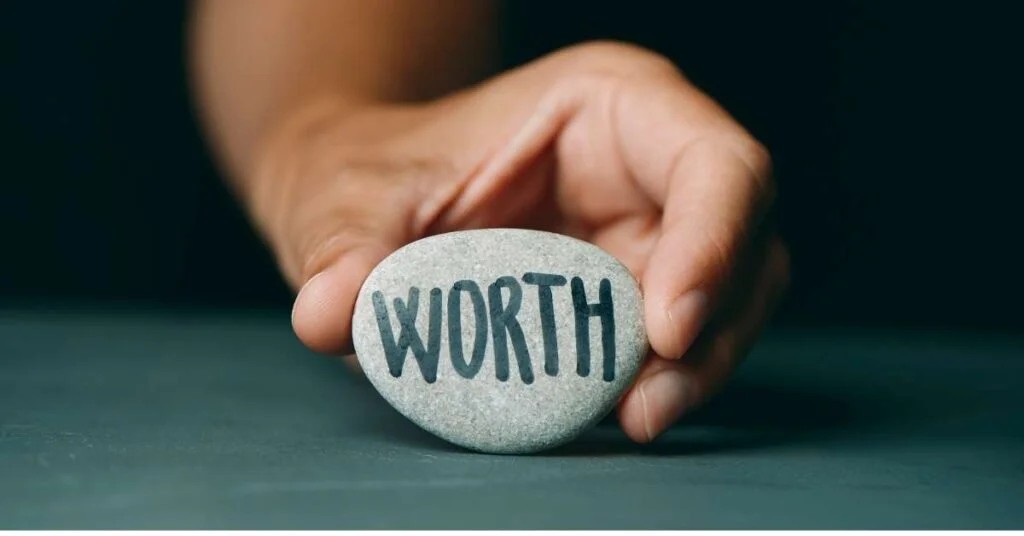Nigeria’s political milieu, warts and all, is dynamic, feisty, loud, vibrant, winner-takes-all, and at times, quite literally, a do-or-die affair!Serious political gladiators of whichever ideological leanings, generally do not take prisoners. Inevitably, there are hardly any policy decisions at the national or state level, where such actions are not forensically examined from a calculated political prism.
Thus, Nigeria’s President Bola Ahmed Tinubu’s decision to rename the National Theatre, Iganmu, Lagos after Emeritus Professor Wole Soyinka, 1986 Nobel Prize Winner for Literature, has generated passionate debates for and against in the country. Is there a really serious contention or is at all a storm in a teacup?
Modelled after Bulgaria’s military-hat(sardonically christened “fila pepeye”by Yorubas or “duck’s hat”) Palace of Culture and Sports in Varna, completed in 1968, the National Theatre was conceived during the regime of Nigeria’s former military ruler, (Rtd) General Gowon (1966-1975), and completed in 1976 in the military era of (Rtd) General Olusegun Obasanjo (1976-1979).
At its zenith, it was equipped with state-of the-art equipment, a 5000-seater main hall capacity, a collapsible stage, cinema halls, language translation services. Its completion was just in time for the Second All African Festival of Arts and Culture, January 15, 1977 toFebruary 12, 1977, (FESTAC 77) which Nigeria sponsored and hosted at the very same National Theatre in the days of Nigeria’s phenomenal oil boom.
The petrodollars’ boom spurned Nigeria’s increased recurrent, social and capital expenditure and yielded housing developments like FESTAC Town, Satellite Town in Lagos, then the country’s political capital. The boom also spurned the inflationary Udoji salary award, an exponential rise in the costs of governance given the creation of additional states and the accompanying bureaucratic burdens.
Scant attention was paid to developing and sustaining the agronomy and manufacturing sectors just as the country relied heavily on the importation of goods and services. The ethno-musicologist, Jimi Solanke (1942-2024) criticised that unsustainable phenomenon in his captivating Calypso song: Oil Boom, Palaver Dey for Town. In sharper perspective,the country’s Gross Domestic Product rose 636.7 per cent from $5.2 billion in 1966 to $36.31 billion by 1976, according to the International Monetary Fund.
On the flip side, the country in that turbulent decade of intense political upheavals, witnessed three bloody military coups; in January 1966, which toppled the Balewa government; July 1966, which toppled the General Aguiyi-Ironsi regime, and February 1976, which claimed the lives of then head of state, General Murtala Mohammed, his ADC, Lieutenant Akintunde Akinsehinwa and Colonel Ibrahim Taiwo. Hitherto, a bloodless coup ousted the regime of General Gowon in July 1975.
Plus, the country had witnessed an extremely vicious Biafra/Nigeria Civil War (1967-1970), with the loss of over 2,000,000 Biafrans (Encyclopaedia Britannica). The material point here is that a substantial degree of social investment was absolutely essential to give meaning and effect to Gowon’s post-war 3Rs’policy of Reconstruction, Rehabilitation and Reintegration.
Nevertheless, the important question as to whether public expenditure was consistently targeted at socio-economic programmes continues to be debated. This point was also made by the iconoclastic Afrobeat icon, Fela Anikulapo-Kuti in the song Unknown Soldier, where he sharply criticised the Obasanjo military regime for “wasting money on FESTAC.”
Paradoxically, exactly a week after the FESTAC celebrations, on Saturday, February 19,1977, Fela’s house on Lagos Mainland (“Kalakuta Republic”) was attacked by hundreds of soldiers where he was savagely attacked, alongside his politically influential 78-year-old mother, Mrs Olufunmilayo Ransome-Kuti, members of his Afrika 70 band, and other occupants of the popular “Republic.”
Paradoxical, because Fela was a foremost artistic, cultural, and musical icon globally. Paradoxical, because FESTAC evidently aimed to celebrate African arts, culture and Pan-Africanism. Paradoxical, because the National Theatre was the main venue for all the main performances from cultural, literary and musical icons from the diaspora. And paradoxical, because it was an unhappy commentary on Nigeria’s “commitment” to the rule of law notwithstanding the subsistence of a military regime!
More generally, the nexus between the arts, culture and the social political context is symbolised by the rich diversity of events which have been held at the National Theatre from its inception 49 years ago. Afterall, former President Carter’s unflinching commitment to human rights and legal orthodoxy on the African was evident in his seminal U.S. foreign policy speech at the National Arts Theatre, Lagos, on April 1, 1978 viz: “We (United States of America) share three basic commitments to the future of Africa. We share with you a commitment to majority rule and individual human rights.
In order to meet the basic needs of the people, we share with you a commitment to economic growth and to human development. We share with you a commitment to an Africa that is at peace, free from colonialism, free from racism, free from military interference by outside nations, and free from the inevitable conflicts that can come when the integrity of national boundaries are not respected.”
It has also hosted from of the finest home grown and international artistes traversing several generations. Where does one begin? Nigeria’s theatre doyen, ace musician, actor, former church organist and ex police officer, the legendary Pa Hubert Ogunde (1916-1990) staged his Aiye and Igba t’Ode to global acclaim at the National Theatre. The immortal Highlife musician, former staff of the Nigerian Railways, Ebute Metta, Pa Julius Araba (1922-1981), aside from performing for Queen Elizabeth II in 1956 at Odan (“Race Course”), Lagos, also performed at the National Theatre at various times. He was an ace composer, guitarist, lyricist, vocalist and often times performed with his wife (who sang and played the shekere or maracas).
Pa Araba composed the popular Highlife songs, Artificial Hair, Easy Motion Tourist, Iyawo Mapami, Kelegbe Megbe and other hits, whilst influencing a generation of artistes including Fela Kuti, Sunny Ade, Ebenezer Obey et al.
Across the Atlantic, the National Theatre, Lagos has hosted the outperforming Guyanese/Trinidadian Calypsonian, Slinger Francisco (a.k.a. The Mighty Sparrow), during FESTAC 77. Sparrow recently turned 90! The Mighty Sparrow loved the National Theatre and Lagos so much at the time that he composed and recorded a beautiful song, in Yoruba, called “Duduyemi” or “Black Beauty” at the time.
In appreciation, the King of Lagos at the time, Oba Adeyinka Oyekan II accorded Sparrow the Eko chieftaincy title “Omowale of Lagos.” The National Theatre has also hosted leading groups and stars including South Africa’s Miriam Makeba and Ipi Tombi, Liberia’s Miatta Fahnbulleh, Ghana’s Osibisa, Brazil’s Gilberto Gil, Congo Zaire’s sorcerer of the guitar, Le Grand MaîtreFranco Luambo Makiadi and OK Jazz, USA’s Dynasty, Brothers Johnson, Shalamar, Lakeside, Skyy, Kool & The Gang, Stevie Wonder.
In later years, the Theatre hosted Tony Benson, Femi Kuti, Musical Youths, Baba Suwe, Burna Boy, Ireti, etc. In season however, the National Theatre was trapped in decadence, decay, and disrepair, becoming a veritable magnet for anti-social behaviour and criminality. However, with imagination, initiative, passion, zeal and strong cross-sectoral partnership, things have changed for the better.
Professor Wole Soyinka is a global figure, literary giant and proactive rights activist. A distinguished alumnus of the prestigious Government College Ibadan (founded 1929), University of Ibadan, Leeds University amongst other strikingly significant meritorious accomplishments, he staged his first play, The Invention, was produced at the Royal Court Theatre, London, in 1957.
Quite apart from being the first African Nobel Prize Winner for Literature in 1986, Soyinka has written 25 plays, five memoirs, three novels, seven poetry collections, countless articles, short stories and columns over several decades.
In the aftermath of Nigeria’s January 1966 coup (supra), Soyinka, surreptitiously met then military governor of South Eastern Nigeria, the Oxonian, Colonel Chukwuemeka Odumegwu Ojukwu in an attempt to impede the Nigeria/Biafra Civil War, thereby saving human lives and misery. He was ousted by Gowon’s federal troops and imprisoned for approximately two years by the Nigerian Government.
During his years in exile following the brutal dictatorship of General Sani Abacha (1993-1998), Soyinka penned The Open Sore of a Continent, a robust critique of Africa’s cultural identity, leadership, politics, statecraft and the complexities therein at the turn of the 20th century.
And yes, Soyinka has railed against the sycophantic renaming of Nigerian public institutions over the years and military rule over the years. For example, despite a consistent campaign against military dictatorship, Soyinka served as the pioneer leader of Nigeria’s Federal Road Safety Corps, through 1988 and 1992, under former military ruler, General Ibrahim Babangida.
Likewise, Soyinka was vociferously opposed to posthumously renaming University of Lagos after Chief Moshood Abiola (Nigeria’s de facto President Elect!) in 2012 by President Goodluck Jonathan on the grounds that the latter ought to: “re-consider and perhaps shift his focus to the nation’s capital for institutions begging for rituals of re-naming.
After all, it is on record that the House of Assembly did once resolve that the Abuja stadium be named after the man already bestowed the unique title of “Pillar of African Sports.” Furthermore, Soyinka has opined on challenging a past leader over the branding of a key arterial network after “one of the most brutal and venal rulers we’ve ever had in this country.”
Notwithstanding, iconic theatres around the world like New York’s Carnegie Hall and Stephen Sondheim Theatre, and London’s Cadogan Hall, Gielgud Theatre, Novello Theatre, and Wigmore Hall, are named after great cultural and literary giants.
Objectively therefore, there is absolutely no reason why the National Theatre, Lagos, should not be named after Soyinka because he has earned the right several times over. Therefore, in the answering the original question; this is all a ginormous storm in a teacup!
Ojumu is the Principal Partner at Balliol Myers LP, a firm of legal practitioners and strategy consultants in Lagos, Nigeria, best-selling author of The Dynamic Intersections of Economics, Foreign Relations, Jurisprudence and National Development (2023).






